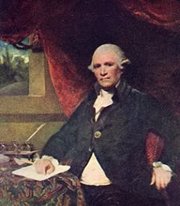Samuel Whitbread (brewer)
|
|
Samuel Whitbread (August 30, 1720 - June 11, 1796) was an English brewer and Member of Parliament. In 1742, he established a brewhouse that later - in 1799 - became Whitbread & Co Ltd.
Samuel Whitbread was born at Cardington in Bedfordshire, the seventh of eight children. He left for London aged 14 and became an apprentice to a London brewer, John Witman. In 1742, he went into partnership with Thomas Shewell, investing £2,600 in two of Shewell's small breweries, the Goat Brewhouse (where porter was produced) and a brewhouse in Brick Lane (used to produce pale and amber beers). Demand for the strong, black porter meant the business had to move to larger premises in Chiswell Street in 1750.
By 1760, it had become the second largest brewery in London (producing almost 64,000 barrels annually). Five years later (1765), Whitbread bought out Shewell for £30,000. By the end of the century, Whitbread's business was London's biggest producer of beer, producing 202,000 barrels in 1796. The brewery was also one of the first to employ a steam engine (purchasing a sun and planet engine from James Watt's company in 1785).
Whitbread was elected Member of Parliament for Bedford in 1768, and held the seat until 1790. He is said to have been the first to mention slavery in the House of Commons.
In May 1787 the brewhouse was visited by King George III and Queen Charlotte.
His son was the politician, Samuel Whitbread.

